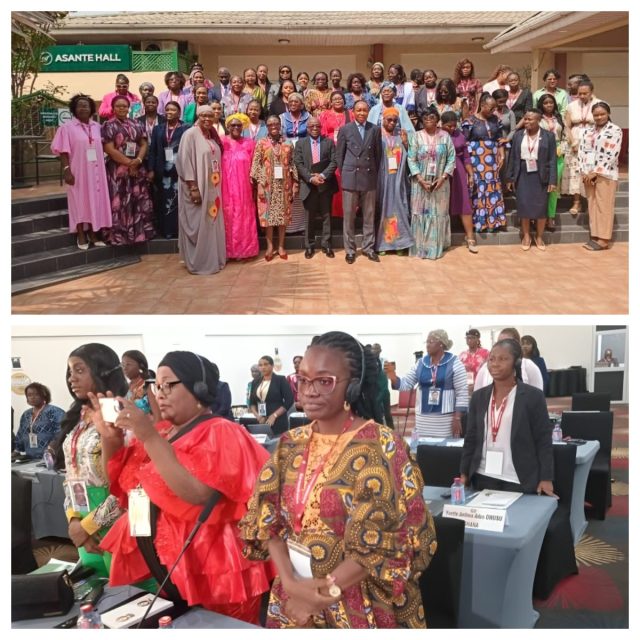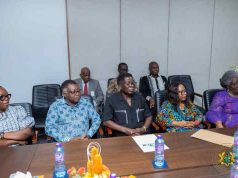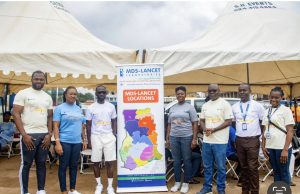On Tuesday 17th December 2024, as part of measures to intensify awareness against the deleterious effects of Money Laundering and Terrorist Financing (ML/TF) in the West African region, GIABA, in partnership with the ECOWAS Gender Development Centre (EGDC), opened a 3-day Regional Roundtable Engagement & Workshop For Women On The Impact Of Money Laundering And Terrorist Financing (ML/TF) on the ECOWAS Region at the Alisa Hotels in Accra.
The 3-day workshop, which will climax Thursday 19th December 2024, seeks to raise awareness on the risks faced by women in relation to transnational organized crime, including the impacts of money laundering and terrorism financing.
The workshop has brought together women’s groups, gender advocates and associations, NGOs and civil society organizations from various circles of ECOWAS member countries.
The Inter-Governmental Action Group against Money Laundering in West Africa (GIABA) is a specialized institution of the Economic Community of West African States (ECOWAS) as well as Financial Action Task Force –Styled Regional Body (FSRB) responsible for combating the scourge of Money Laundering (ML) and Terrorist Financing (TF) in West Africa.
GIABA was established by the Authority of Heads of State and Government of the Economic Community of West African States (ECOWAS) in the year 2000 with the mandate to protect the national economies and the financial systems of member States from abuse and the laundering of the proceeds of crimes.
Addressing the opening ceremony, Ghana’s Minister for Gender, Children and Social Protection, Dakoa Newman in a speech read on her behalf stated that Transnational Organized Crime activities are on the rise across West African countries, and these include money laundering, drug trafficking and terrorist financing which poses significant risks to women in our various ECOWAS Member States, exacerbating existing vulnerabilities and inequalities that is perpetrated for economic gain.
She noted that the essence of the roundtable forum is critical and timely as it brings together decision makers from ECOWAS Member States and other key stakeholders to foster dialogue and build consensus on integrating women’s perspectives into the fight against transnational economic and financial crime across the ECOWAS Region to further strengthen gender equality and women’s empowerment.
“The Ministry of Gender, Children, and Social Protection (MoGCSP) which serves as the main government machinery for the promotion of gender equality in Ghana has harmonised and mainstreamed gender into social protection programmes and other governmental interventions to effectively support and protect the vulnerable and marginalised for sustainable national development.
….I am happy to announce that the Republic of Ghana has passed its Affirmative Action (Gender Equity) Bill into Law. The Affirmative Action (Gender Equity) Act, 2024 Act 1121 is to effectively and efficiently address gender imbalances in the political, social, economic, educational and cultural spheres of the Ghanaian society. Additionally, the Act seeks to ensure greater gender diversity in leadership roles which will propel better financial performance,” she revealed.
She extended her heartfelt gratitude to GIABA saying that women and girls on the continent appreciate GIABA’s interest in addressing issues of transnational economic and financial crimes which ensures that everybody matters in the development agenda of ECOWAS.
“I would like to extend my heartfelt gratitude to ECOWAS and GIABIA for their immense support and commitment to this cause. Our collaboration and dedication will go a long way to addressing this menace in the sub- region.
…Our being here is a testament of our collective commitment to addressing transnational organized crime risk for women in the sub region. Indeed, everybody matters in the ECOWAS development agenda. We do value your time with us in Ghana to plan a common path that will propel the kind of growth we expect as far as the protection of women and girls from transnational economic and financial crime are concerned.
Hon. Dakoa Newman further admonished ECOWAS member states to mainstream gender into policies.
“In our pursuit to counter transnational organized crimes, I urge all Member States to adequately mainstream gender into policies, strategies and programmes as well as strengthen collaboration between the Security Agencies, Financial Institutions, Youth Organisations and the Ministries responsible for Gender and Family Welfare. Our Considering the active role that women play in these organized financial crimes we need to have targeted programmes to prevent it and protect them,” she indicated.
She charged all stakeholders reaffirm their commitments and form stronger partnerships in creating a more inclusive and equitable society.
On his part, Dr Jeffrey ISIMA, who addressed the forum on behalf of the Director-General of GIABA, Mr. Edwin W. Harris, lamented that despite measures put in place to combat money laundering and terrorist financing, the menace keeps booming with criminals developing more sophisticated methods to outwit the systems.
He mentioned that Sub-Saharan Africa stands out as the region with the highest money laundering risk.
Dr. ISIMA also disclosed that in 2023, the estimated amount of money laundered annually was almost 5% of the global GDP, or $800 billion; and it is projected that up to $5.05 trillion will be laundered globally in 2024.
“This figure is larger than the GDP of all but a handful of countries and represents correspondingly huge risks to global financial stability and to the financial well-being and stability of many countries.
At least $300 billion is laundered every year in the US; Over £100 billion is annually laundered in the UK; About €100 billion is laundered in Germany each year; In 2022, Russians had about $1 trillion of dark money, hidden abroad. The US State Department estimates that $154 billion is laundered in China.”
Taking his turn to speak, Mr. Kwaku Dua, the GIABA National Correspondent for Ghana and the Chief Executive Officer of the Financial Intelligence Centre (FIC)said Ghana remains committed to combating organized crime, with a focus on empowering women in the fight against money laundering and terrorist financing.
Mr. Dua further expressed Ghana’s dedication to creating an unfavorable environment for transnational organized crime:
“It is an honor to be part of this important program, which is dedicated to empowering women against organized crime. Ghana has consistently strengthened its legal frameworks and institutions to combat these crimes, particularly those affecting vulnerable groups such as women and children.”
Focus on Gender and Transnational Crime
Mr. Dua highlighted the critical role women play in both the fight against and the impacts of organized crime. He acknowledged the dual reality: while women are often victims of crimes like human trafficking, there is growing evidence of their involvement in orchestrating some criminal activities.
“This workshop is timely, as these crimes continue to impede economic growth and violate human rights. I hope that discussions will explore strategies to address these vulnerabilities and share best practices to curb transnational organized crime in our region,” he added.
The workshop aligns with the protocols of the United Nations Convention against Transnational Organized Crime (UNTOC), which Ghana ratified to combat human trafficking, smuggling, and illicit trade in firearms. Mr. Dua stressed that these frameworks are essential to protecting human rights and reducing vulnerabilities that benefit criminal networks.
Key Strategies and Collaborative Efforts
Mr. Dua called for gender-sensitive laws and the prioritization of anti-money laundering and counter-financing of terrorism measures.
He emphasized the importance of collaboration among stakeholders, including law enforcement agencies, civil society organizations, and regional and international bodies.
“Our discussions must focus on gender-based laws and deepening collaborative efforts. It is only through such collective actions that we can achieve significant progress in the fight against transnational organized crime,” he noted.
The FIC boss also underscored Ghana’s commitment to consistently implementing effective, proportionate, and restrictive measures to combat crime.
A Milestone for West Africa
The workshop, which concludes on December 19, is expected to generate actionable strategies for reducing the prevalence of money laundering, human trafficking, and terrorist financing in the region.
Participants will also explore ways to protect the rights of smuggled migrants and empower women to take an active role in combating these crimes.
As the workshop unfolds, Ghana’s leadership and the collective efforts of ECOWAS member states highlight the growing recognition of women’s pivotal role in tackling organized crime and promoting regional stability.
Send your news stories to newsghana101@gmail.com
Follow News Ghana on Google News













